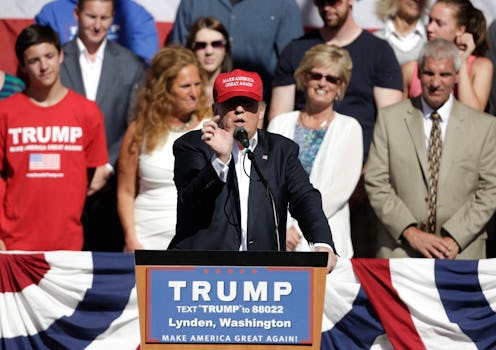News
No, Donald Trump Has Not Exploded Data Journalism
Since becoming a statistics dreamboat in 2008, when he correctly predicted the general election results in 49 of the 50 states, plus the District of Columbia (only Indiana got away), Nate Silver has been our go-to guy for political data journalism. Nevertheless, he failed to predict the rise of Donald Trump. You'd think that if anyone could have done it, it would have been Silver. But really, could anyone have gotten the Trump narrative right from the beginning?
The polls have been virtually nothing but Trump for nearly a year now, but no one took them seriously. Sure, they said he led by massive margins, but they didn’t count IRL, because he was not considered a “real” candidate until quite recently. Silver’s site, FiveThirtyEight, was no more correct than anyone else. For this, he issued a comprehensive mea culpa today: “How I Acted Like A Pundit And Screwed Up On Donald Trump.”
The whole thing is quite good, and I definitely recommend you take a few minutes to read it in full. It explains Silver’s thought process as he ignored the polls and predicted that Trump was not long for the GOP race. Toward the end, he touches on what might be one of the most important lessons to draw from this: Trump, as we know, is an anomaly. That’s why no one predicted him. Thus, to alter our methods for predicting election outcomes in the future because of his success could easily be a mistake.
“There’s a danger in hindsight bias,” Silver wrote, “and in overcorrecting after an unexpected event such as Trump’s nomination.” Basically, we all got it wrong about Trump, but it wasn’t because our methods were worthless; it was because Trump is such a unique phenomenon that he exploded them. Accordingly, that doesn’t mean that the traditional methods won’t work again once the dust has cleared from all this. Trump may have irreparably damaged the Republican Party, but he hasn’t necessarily damaged data journalism. It just looks that way right now.
What interests me most is how Silver thinks the polls – as opposed to punditry – will predict the general election. He touched on it when discussing what he calls “polls-only” versus “fundamentals” models:
Still, Trump’s nomination comes at a time when I’ve had increasing concern about how much value other types of statistical indicators contribute as compared with polls. While in primaries, there’s sometimes a conflict between what the polls say and “The Party Decides” view of the race, in general elections, the battle is between polls and “fundamentals.” These fundamentals usually consist of economic indicators and various measures of incumbency. (The conflict is pertinent this year: Polls have Clinton ahead of Trump, whereas fundamentals-based models suggest the race should be a toss-up.
Donald Trump has, as you’ve heard many times, exposed the fractures in the GOP, and that’s something we cannot unsee. But at least we can take comfort in the fact that his existence is truly an anomaly. Whatever damage he does, at least we aren’t likely to see another Trump for a long time.
